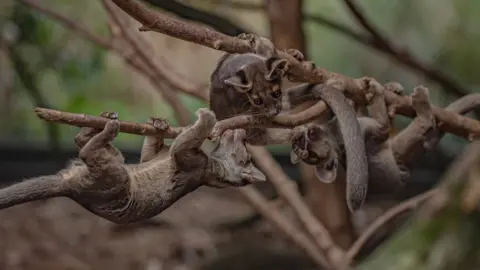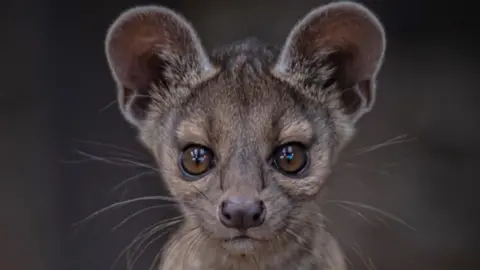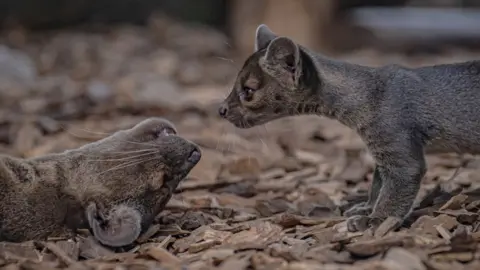Rare sighting of first fossa pups born at Chester Zoo
 Chester Zoo
Chester ZooA zoo has shared rare footage of the first fossa pups to be born in its 91-year history.
The 12-week-old triplets were spotted for the first time by keepers as they emerged from their den at Chester Zoo in Cheshire.
The tiny trio, born to the zoo's five-year-old adult fossas named Shala and Isalo in July, have been identified as one male and two females.
But zookeepers are yet to decide on names for the youngsters.
Growing up to 1.8m (6ft) from nose to tail tip, and weighing up to almost two stone (12kg), fossas are a distant relative of the mongoose.
The slender, long-tailed, cat-like mammals are a threatened species endemic to Madagascar.
 Chester Zoo
Chester ZooTheir long tails help keep their balance when leaping among tree branches and the species is considered one of the world's most elusive carnivores, so much so that conservationists have had trouble observing them.
Zookeeper Rachael Boatwright said: "While it's still early days, the three pups are doing great and are now full of confidence as they learn to climb trees and explore together, all under the watchful eye of mum, of course."
She continued: "The birth of Shala's triplets is a huge cause for celebration.
"Not only are they the first pups to ever be born at our zoo, but their arrival into the endangered species breeding programme will allow us to discover more about their behaviours - from tiny pups all the way to adults."
 Chester Zoo
Chester ZooThere are only as few as 2,600 remaining fossas in the wild.
Conservationists from Chester Zoo have been helping to protect endangered habitats in Madagascar for more than 10 years.
Mike Jordan, director of animals and plants, said the zoo's new additions have given conservationists "hope" amid fears the species could face extinction due to deforestation.

Why not follow BBC North West on Facebook, Twitter and Instagram? You can also send story ideas to [email protected]
